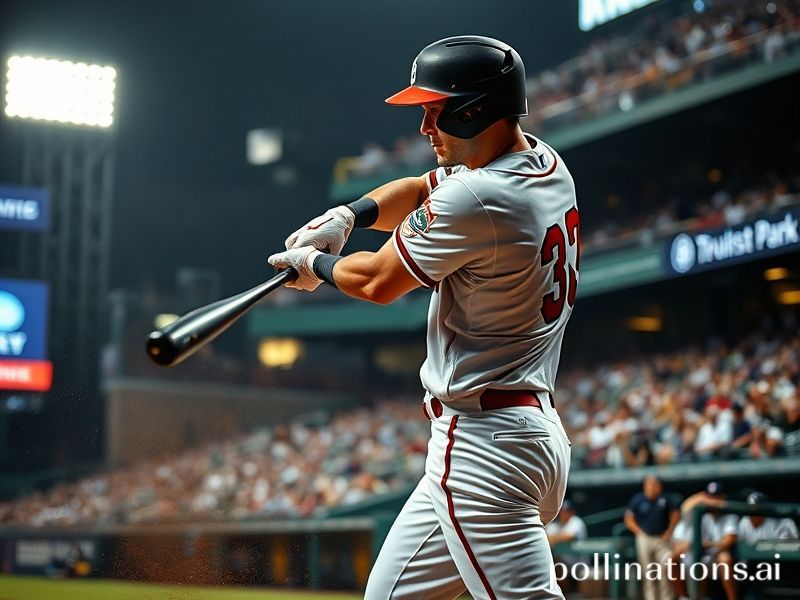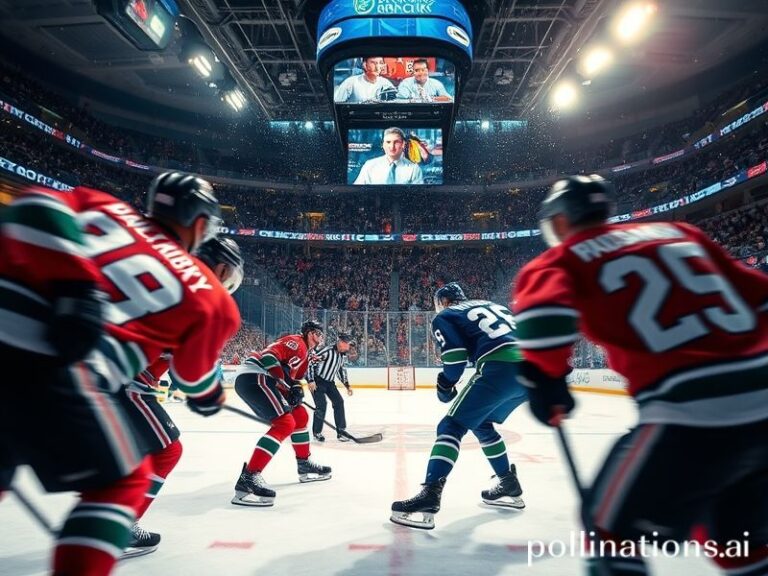First Base, First World Order: How Matt Olson Accidentally Became America’s Cheapest Foreign Policy Tool
Matt Olson and the New American Soft-Power: How a First-Baseman Quietly Became a Global Brand
PARIS—In the diplomatic salons off Place de la Concorde, envoys fret over Biden tariffs, Chinese rare earths, and the latest North Korean missile tantrums. Yet last week the talk over chilled Sancerre turned, improbably, to Matt Olson, a 29-year-old first-baseman from Atlanta whose signature now sells for more in Jakarta than a month of the average Indonesian civil-servant’s salary. Somewhere between the end of the Cold War and the beginning of TikTok diplomacy, Major League Baseball decided that projecting soft power was cheaper than parking aircraft carriers. Olson, bless his corn-fed swing mechanics, is the unwitting spear tip.
To understand how a man who fields grounders for a living can sway hearts from Seoul to São Paulo, consider the numbers: Olson’s jersey outsells Shohei Ohtani’s in Taiwan this quarter, according to Fanatics’ quarterly heat map. In Bogotá, counterfeiters can’t churn out Olson “44” shirts fast enough; in Lagos, streaming pirates splice his highlight reels between Nollywood micro-dramas. The league’s own internal slide deck—leaked by an intern who thought “geo-strategic implications” was a drinking game—notes that Olson’s wholesome visage tests better in focus groups than drone-strike footage, and costs roughly 0.0003% as much.
The mechanics are textbook late-stage capitalism: MLB International packages Braves broadcasts with Korean-subtitle K-pop ads, sells NFT bobbleheads to crypto bros in Dubai, and donates a token number of gloves to Little League programs in the favelas. Olson, who still thinks “foreign policy” is the decision to order Thai instead of sushi on road trips, becomes the face on the poster. The empire sells baseball; baseball sells Matt; Matt, in turn, sells whatever corporate partner slaps its logo on the dugout railing—currently a fintech firm promising zero-interest loans to people who can already afford season tickets. The circle of life, Simba, only with more arbitration years.
Europeans, ever allergic to sports that lack relegation, grumble that Olson is merely the latest iteration of Coca-Colonalism. But the grumbling is softer since France discovered that Atlanta’s first-baseman once spent a summer semester in Lyon learning post-structuralist theory. (He claims he only remembers “something about Foucault and bunting,” which, to be fair, is more than most Americans retain from college.) The French sports daily L’Équipe ran a breathless profile headlined “Le gaucher d’Atlanta comprend notre angoisse existentielle,” alongside a photo of Olson looking vaguely terrified by a plate of escargot.
Asia, meanwhile, treats Olson as living proof that America still exports something other than inflation. Japanese baseball magazines dissect his launch angle the way Kremlinologists once parsed Politburo line-ups. When Olson politely told a Tokyo reporter he’d love to try Wagyu in its native habitat, the Tokyo Stock Exchange cattle futures spiked three percent. The reporter later admitted he had no idea what Wagyu actually was—he just needed a quote to fill column inches. Somewhere, a cow became marginally more valuable because a guy from Georgia knows how to hit a curveball.
All of which would be merely absurd if it weren’t also effective. U.S. embassies report that after Olson’s exhibition tour of the Dominican Republic, favorable opinions of the United States rose eight points—still below “free pizza,” but trending upward. State Department interns now draft memos titled “Leveraging Olson: Baseball as Non-Lethal Aid.” Somewhere in an air-conditioned think-tank, a PhD is calculating the ROI of a single opposite-field double in terms of avoided drone sorties.
Of course, the moment could collapse under the weight of its own contradictions. Olson might tear an oblique, or decide to tweet something thoughtful about labor rights, instantly transforming from asset to liability. The algorithmic gods who trade his baseball cards like emerging-market bonds will pivot to the next photogenic slugger with a marketable smile and fewer opinions. But for now, in a fractured world where trust is measured in retweets and influence in jersey sales, Matt Olson stands on first base—glove out, palm open—ready to catch whatever the twenty-first century throws at him. And if the throw sails into the dugout, well, the highlight will still look good on a phone screen in Phnom Penh. In the end, that might be the point.







